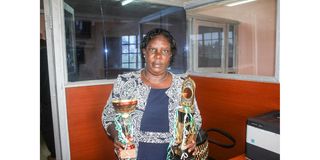Rural Sacco powering women to financial freedom

Esther Kiplagat, Sochem Sacco chairperson with some of the trophies they have won.
What you need to know:
- In 2012, 50 groups in Elgeyo Marakwet merged and transformed into a giant Sacco of 500 members.
- Sochem Sacco represents the three divisions; Soy, Chepkorio and Metkei in Keiyo South Sub-county.
- Today, this rural-based Sacco’s revolving fund stands at Sh90 million.
The desire to escape the poverty trap brought a group of women in Elgeyo-Marakwet County together.
Weighed down with family responsibilities, they started a savings scheme, Sochem Sacco and Invest- an initiative that is paying off.
Previously, the 50 groups in the Sacco, operated as distinct self-help groups engaging in merry-go-round activities.
In 2012, the groups merged and transformed into a giant Sacco of 500 members. Each member contributed Sh380.
“Sochem Sacco represents the three divisions; Soy, Chepkorio and Metkei in Keiyo South Sub-county. Our members mostly consist self-employed women,” explains Esther Kiplagat, the Sacco chairperson.
252 groups
Located in Nyaru, along Eldoret-Eldama-Ravine Road, the Sacco currently has 2,500 members with women accounting for 85 per cent. Members are drawn from 252 groups constituting 10 to 15 members each.
In 2013, their revolving fund stood at Sh100,000. Today, this rural-based Sacco’s fund stands at Sh90 million. Members are eligible to short-term and long-term loans whose rates are lower than that of local banks.
“A member can borrow three times their savings. A single member is currently able to access a loan of up to Sh1.4 million. This Sacco has brought finances closer to the local community,” explains Ken Kimutai, a Sacco manager.
In 2014, they held an annual general meeting (AGM) and elected office bearers. They have a board composed of nine members and three supervisory committee members. They currently employ 11 people who manage their day-to day operations.

A staff at the Sochem Sacco attends to one of their members.
In 2015, they bought a parcel of land and put up a building that hosts their offices while the rest are rented out.
Initially, members contributed Sh2,000 but later doubled to Sh4,000 to cater for the office construction.
The Sacco has transformed the livelihoods of dozens of women in the rural areas.
“Previously, women could not get bank loans, which required title deeds. They had to find alternative ways of getting title deeds as security, because their husbands could not give them the documents or cows,” says Nelly Chebasa, a member.
Ms Chebasa explains that even though she joined the Sacco three years ago, the lender has enabled her boost her boutique business.
“I have been able to borrow three times, between Sh400,000 and Sh1million,” she says.
Stella Tuwei, another beneficiary says they could initially access loans of up to Sh10 000, but now they are able to get between Sh200,000 and Sh300,000. She has switched from selling second-hand clothes to new ones, educated her children and purchased a piece of land.
The Sacco has won accolades not just from the locals, but from outsiders too. For three years in a row (2017 to 2019), it bagged three awards as the best Sacco in the Elgeyo-Marakwet County during the World Cooperative Day. Last year, the event was not held due to Covid-19 pandemic.
Covid-19
Some challenges they face, like any lending facility, are defaulters. For instance, due to financial constraints occasioned by Covid-19, loan repayment dropped and the Sacco was forced to restructure them. The officials also regret the recent decision by the Sacco Societies Regulatory Authority (Sasra) to come up with what they consider punitive regulations, making them encounter high fees and taxation.
They say it was unfair for the body to introduce taxes and fees to apply to all Saccos.
“Sasra failed to engage us through public participation when making laws. For instance, there are those that are on a payroll then there those in coffee or dairy farming.
“Previously, we had special arrangement for our members with low income, where we spread out loan repayment. Most of them are rural folk and their income is unpredictable, unlike those on payroll, meaning that most Saccos will not be able to meet the obligations,” observes Ms Kiplagat observing that a member can tell you the cow they relied on to repay the loan died and you have to restructure the loans.
She says it would be advisable for Sasra to categorise Saccos based on their financial strength, then introduce friendly laws to accommodate them.
Sochem Sacco hopes to grow their membership and work on major economic projects to uplift themselves.





